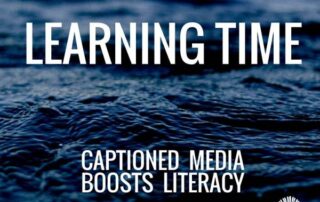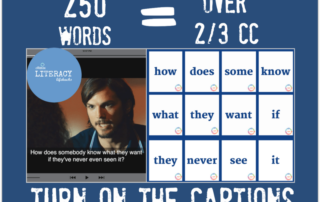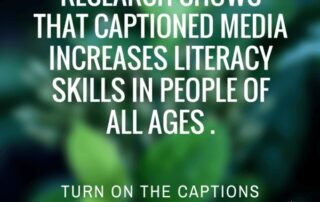The Impact of 250 Words on Literacy
Ollibean Literacy Lifehacks : Tools for parents and care providers without education backgrounds to easily provide literacy instruction. Sign up for our free Flashcards of the 250 Words that represent over two-thirds of captioned television.
250 Words Represent Over Two-Thirds of Captioned Television
"There are more than 500,000 words in the English language, but a person who masters only 250 words will recognize more than two-thirds of all words shown in television captions—provided the 250 words are those that are most frequently used. Equally dramatic, a beginning reader could be taught just 10 words—the, you, to, a, I, and, of, in, it, that—and then recognize more than one out of every five words. Mastery of the top 79 words means being able to read half of all words captioned." Source: Perspectives in Education and Deafness, Volume 16, Number 1, September/October 1997 Henry and
How to Improve Literacy Without Even Trying
One of the simplest things you can do to improve your child’s reading skills is already in your home. Closed captioning is free, easy to use, and a natural literacy booster. Research shows that closed captioning increases literacy skills in people of all ages. Simply having the captions on can dramatically improve vocabulary, word recognition, comprehension, and reading . Closed Captioning supports literacy for all. by Lauri Swann Hunt Turn on the closed captioning in your home; on your tvs, ipads, phones, and computers. Many people think closed captions are only beneficial for deaf and hard of hearing people. And,
Paula Kluth on The Inclusive Class Roundtable
Paula Kluth's strategies for teachers who might be reluctant or don't know where to begin with inclusion on The Inclusive Class Roundtable, as well as some of our favorite things from her website, PaulaKluth.com.
Dean Biklen honored in Kuwait with UNESCO/Emir Jaber al-Ahmed al-Jaber al-Sabah Prize
The United Nations Educational, Scientific and Cultural Organization (UNESCO) will present Syracuse University's School of Education Dean Douglas Biklen with the 2011 UNESCO/Emir Jaber al-Ahmed al-Jaber al-Sabah Prize, honoring him for his work promoting
Center for Literacy and Disability Studies at UNC
The Center’s mission is to promote literacy and communication for individuals of all ages with disabilities. It is the belief of the CLDS that disabilities are only one of many factors that influence an individuals ability to learn to read and write and to use print throughout their life and across their living environments.All individuals, regardless of their abilities or disabilities, have the right to an opportunity to learn to read and write in order to increase and enhance their educational opportunities, vocational success, communicative competence, self-empowerment capabilities, and independence.




